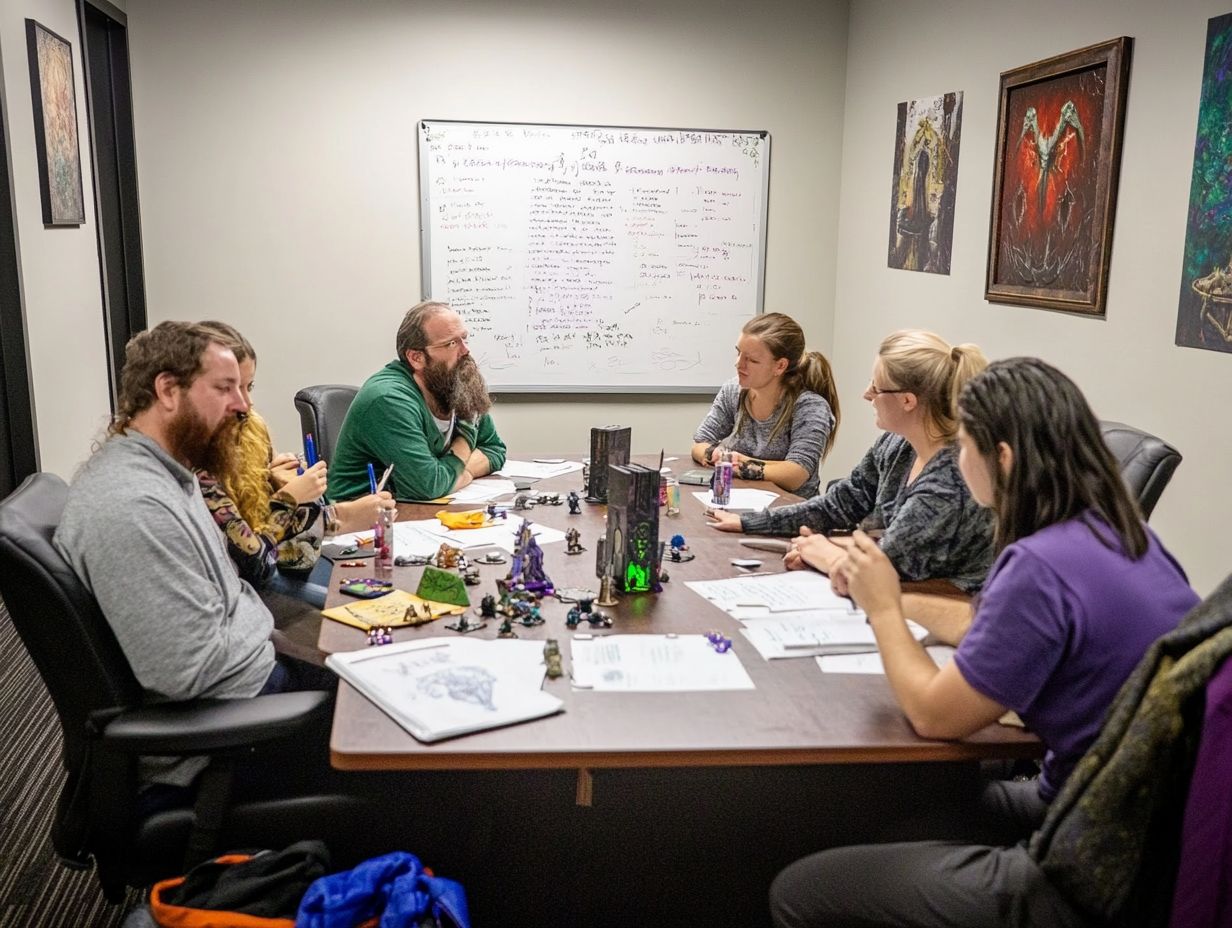How to Use Role-Playing for Language Practice
Role-playing serves as a powerful tool for language learners, transforming your communication practice in remarkable ways.
By stepping into various roles and scenarios, you’ll sharpen your speaking skills, boost your confidence, and improve your fluency all while having fun.
This article delves into the myriad benefits of role-playing for language practice, provides practical tips you can start using right away to seamlessly incorporate it into your learning routine, addresses common challenges you might face, and offers strategies for crafting successful role-playing sessions.
Discover how this dynamic approach can elevate your language skills and turn practice into an enjoyable experience!
Contents
- Key Takeaways:
- Benefits of Using Role-Playing for Language Practice
- How to Incorporate Role-Playing into Language Practice
- Common Challenges and How to Overcome Them
- Tips for Successful Role-Playing Sessions
- Frequently Asked Questions
- What is role-playing and how can it benefit language practice?
- How can I use role-playing for language practice?
- What are some examples of role-playing scenarios for language practice?
- Do I need to be fluent in the language to participate in role-playing for language practice?
- How can I make role-playing more effective for language practice?
- Can I use role-playing for individual language practice or does it require a group?
Key Takeaways:

- Role-playing is a fun and effective way to practice language skills.
- It helps improve communication skills while boosting confidence and fluency.
- To incorporate role-playing, choose a scenario, set it up, and use effective techniques.
What is Role-Playing?
Role-playing is an interactive teaching method that immerses you in authentic situations, helping you learn a language and elevating your communication abilities. This dynamic approach allows you to engage in realistic conversations, significantly enhancing your speaking fluency and confidence in using the language.
As you participate in role play, your teachers create a collaborative atmosphere where you can practice language proficiency in a supportive setting, making it an essential tool in modern language instruction.
By simulating real-life scenarios, you re not only motivated to think critically but also to use vocabulary and grammar rules in context. Role-playing goes beyond merely improving language skills; it cultivates interpersonal communication and sparks creativity among participants.
These educational exercises empower you to navigate social interactions effectively, mirroring real-world experiences. This method has proven effective in capturing student engagement, as many participants often report feeling more invested in the learning process.
Integrating role play into the curriculum offers numerous benefits, including enhanced empathy and a deeper understanding of cultural nuances within language learning.
Benefits of Using Role-Playing for Language Practice
Incorporating role-playing into your language practice brings a wealth of benefits, such as heightened speaking fluency, increased motivation, and valuable contextual learning opportunities.
These engaging activities immerse you in experiences that mirror real-world scenarios, transforming language acquisition into a more effective and enjoyable journey. As you take part in these dynamic exercises, you ll receive immediate feedback and engage in error correction, both of which significantly enhance your fluency and bolster your confidence in professional communication.
Improved Communication Skills
One of the most significant benefits of role-playing in language learning is the enhancement of your communication skills. When you engage in interactive dialogues during role play, you have the opportunity to practice your linguistic abilities in a supportive environment. This not only fosters better peer feedback but also elevates your overall communication proficiency.
This immersive approach isn t just about expanding your vocabulary; it s also about grasping context, tone, and non-verbal cues. As you and your peers assume different roles, you navigate various conversational scenarios that are crucial for real-life interactions. The immediate feedback you receive during these activities pushes you to refine your speaking style, correct misunderstandings, and build confidence in your abilities.
By consistently participating in these exercises, you create an atmosphere where learning becomes a natural process, ultimately leading to a deeper understanding of effective communication.
Increased Confidence and Fluency
Role-playing is a key part of boosting your confidence and speaking fluency. It s an effective strategy in your language learning journey.
Engaging in role-play activities allows you to practice skills in a supportive classroom. This encourages experimentation and risk-taking, enhancing your fluency.
You’ll step into various scenarios, simulating real-life conversations. This fosters a sense of community among peers, making mistakes learning opportunities.
Your teachers guide you, offering positive reinforcement that boosts your confidence. The teamwork involved helps you express yourself clearly.
With consistent practice, your language proficiency progresses, leading to improved communication skills.
How to Incorporate Role-Playing into Language Practice

Incorporating role-playing into your language practice requires careful planning and effective teaching strategies. This ensures maximum student involvement and participation.
Utilize a variety of educational tools and prepare scenarios that resonate with your learners, crafting engaging contexts for their language use. This approach captivates their attention and significantly enhances the overall effectiveness of your lessons.
Choosing a Scenario
Selecting the right scenario is vital for effective role play. It crafts the backdrop for authentic situations that resonate with you.
Scenarios should correspond to your language level and interests. This ensures that the role play activities remain engaging and relevant to your learning objectives.
Consider contexts that reflect real-life interactions, like ordering food at a restaurant or conducting a job interview. By integrating practical situations that mirror everyday experiences, educators can significantly boost your confidence and fluency.
Engaging you in discussions about your own experiences related to these scenarios can further enhance relevance and create a more dynamic learning environment.
Customizing scenarios to incorporate current events or cultural references can ignite interest and foster deeper language comprehension, transforming the role play into an experience that s both educational and genuinely enjoyable.
Setting Up the Role-Play
Setting up the role play effectively requires thoughtful organization of the classroom and clear instructions. Use role cards, which outline each participant’s role in the activity, and encourage collaborative work to foster a supportive atmosphere.
Arrange the classroom to promote interaction consider small groups or circle seating to help students feel more at ease. Clearly define the role cards, outlining each participant’s responsibilities and encouraging them to explore various perspectives.
Pair more outspoken students with quieter ones to create a comfortable dynamic that benefits everyone. Establish ground rules focused on respect and encouragement to enhance confidence, allowing every student to voice their thoughts and contribute meaningfully to the role play experience.
Don t miss out on the chance to improve your language skills!
Effective Role-Playing Techniques
Employing effective role-playing techniques is crucial for maximizing your engagement. It ensures productive outcomes. By utilizing teaching methods that foster interactive dialogues and offer feedback opportunities, you can significantly enhance the role-play experience.
Incorporating strategies such as scenario-based learning and guided group discussions creates a dynamic environment that encourages critical thinking and collaboration. When you encourage your peers to adopt different perspectives, you enrich the learning experience and help them cultivate empathy and problem-solving skills.
Providing structured feedback after role-playing sessions invites learners to reflect on their performance. This helps them pinpoint areas for improvement and apply these insights in future activities. This collaborative approach can lead to a deeper understanding and retention of the material, paving the way for more effective teaching and learning experiences.
Common Challenges and How to Overcome Them
Be prepared for common challenges like student nervousness and the complexities of managing classroom dynamics. These can hinder effective participation.
To navigate these obstacles, implement strategies that foster a supportive environment. When students feel comfortable engaging with challenging scenarios, they can fully contribute to their language learning journey.
Dealing with Nervousness

Overcoming nervousness is vital for your success in role-playing. It directly impacts how well you perform and engage. To build your confidence, teachers can create a positive atmosphere and utilize role-play activities that gradually increase in complexity. This ensures that you stay appropriately motivated.
Providing structured feedback sessions after each role play encourages you to reflect on your experiences and fosters a growth mindset. Engaging in warm-up exercises, like informal group discussions or light-hearted icebreakers, can ease your anxiety by promoting camaraderie among your peers.
Allowing you to choose roles that resonate with your interests enhances your engagement and comfort level. This makes you more likely to participate actively. By emphasizing collaboration and celebrating small successes, educators can create an environment where you feel empowered to take risks and develop your skills effectively.
Handling Difficult Scenarios
Tackling difficult scenarios in role play requires careful planning and creativity. By nurturing a spirit of collaboration, you can guide students through obstacles. This ensures they effectively correct errors and learn from their experiences.
To facilitate this, introduce peer-to-peer feedback sessions. This encourages students to reflect on their own performances while recognizing the strengths and areas for improvement in their classmates. It fosters a supportive environment where individuals feel confident taking risks while developing essential communication skills vital for collaboration.
Incorporating specific techniques, such as modeling effective responses and crafting scenario-based dialogues, provides a structured approach to problem-solving. As students engage with these exercises, they gain valuable insights into their behaviors and the dynamics of teamwork, ultimately enhancing their overall learning experience.
Tips for Successful Role-Playing Sessions
To ensure your role-playing sessions are successful, prioritize creating a safe and supportive environment. This fosters engagement and participation among learners.
Providing constructive feedback, during and after the role play, can significantly elevate the learning experience. This enables students to develop their language skills more effectively.
Creating a Safe and Supportive Environment
Creating a safe and supportive environment is essential for you to make role-playing effective. It encourages greater involvement and boosts your confidence. You can achieve this by setting clear expectations and promoting respect among peers.
Fostering a positive classroom dynamic can also enhance the experience. Incorporating collaborative activities that allow for shared experiences can significantly boost morale and engagement. Encourage open dialogue. This allows you to express your thoughts and feelings, nurturing trust and camaraderie within the group.
Implementing regular feedback sessions gives you the power to understand your strengths and identify areas for improvement, enhancing your comfort levels. When you feel valued and understood, you are much more likely to fully immerse yourself in role-playing exercises, leading to richer, more diverse interactions that ultimately strengthen your learning journey.
Providing Constructive Feedback
Providing constructive feedback is an essential aspect of the role-playing process. It enables you to assess how you did and pinpoint areas for improvement. When delivered timely and specifically, feedback can inspire you to refine your language use and boost your overall proficiency.
Engaging in this reflective dialogue allows you to gain a clearer understanding of your strengths and the areas that need attention. Recognizing feedback as a roadmap for personal growth and skill enhancement amplifies its significance. Each evaluation becomes more than just an assessment; it transforms into a stepping stone toward mastery, helping you delve deeper into the nuances of language and the dynamics of conversation.
Constructive comments motivate you to experiment with new techniques in future scenarios, creating a continuous cycle of learning and development that is vital in any language practice setting.
Frequently Asked Questions

What is role-playing and how can it benefit language practice?
In role-playing, you and your peers take on exciting roles to act out real-life scenarios. It helps language practice by providing a fun and engaging way to practice speaking and listening skills in a realistic context.
How can I use role-playing for language practice?
Choose a topic or scenario that is relevant to the language you want to practice. Assign roles to each participant and give them time to prepare. Then, have them act out the scenario using the language they are practicing.
What are some examples of role-playing scenarios for language practice?
You can use scenarios such as ordering food at a restaurant, conducting a job interview, or negotiating a price in a market. These scenarios allow participants to practice real-life language skills in a controlled setting.
Do I need to be fluent in the language to participate in role-playing for language practice?
No, you do not need to be fluent. Role-playing is a safe and supportive environment for language learners of all levels. It allows you to practice speaking and listening at your own pace.
How can I make role-playing more effective for language practice?
Encourage participants to fully immerse themselves in their roles and use the target language as much as possible. Give feedback and provide opportunities for reflection and improvement after each scenario.
Can I use role-playing for individual language practice or does it require a group?
You can use role-playing for both individual and group language practice. If you are practicing alone, you can take on multiple roles and record your performance for self-evaluation. However, practicing with a group allows for more interaction and feedback.






